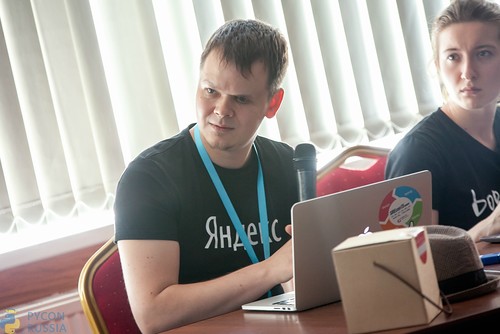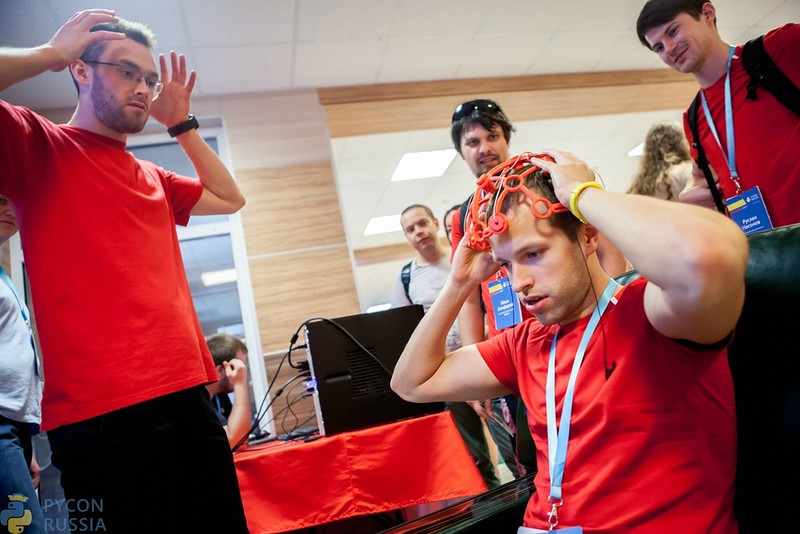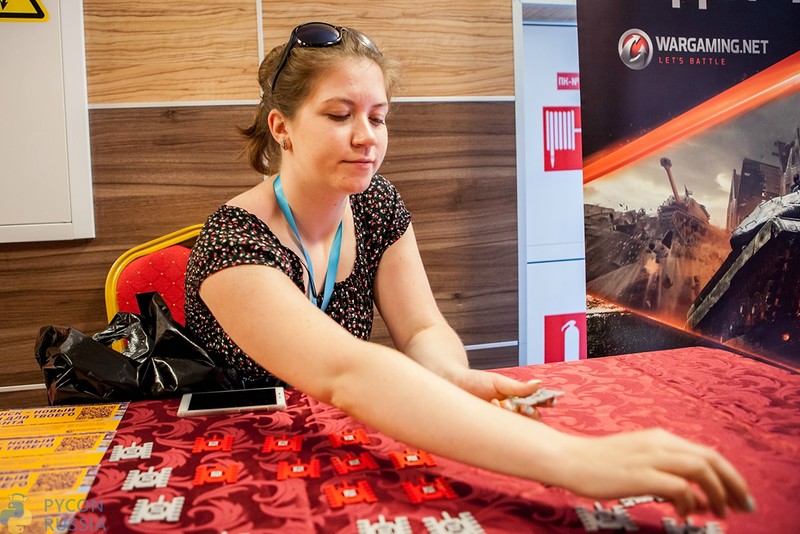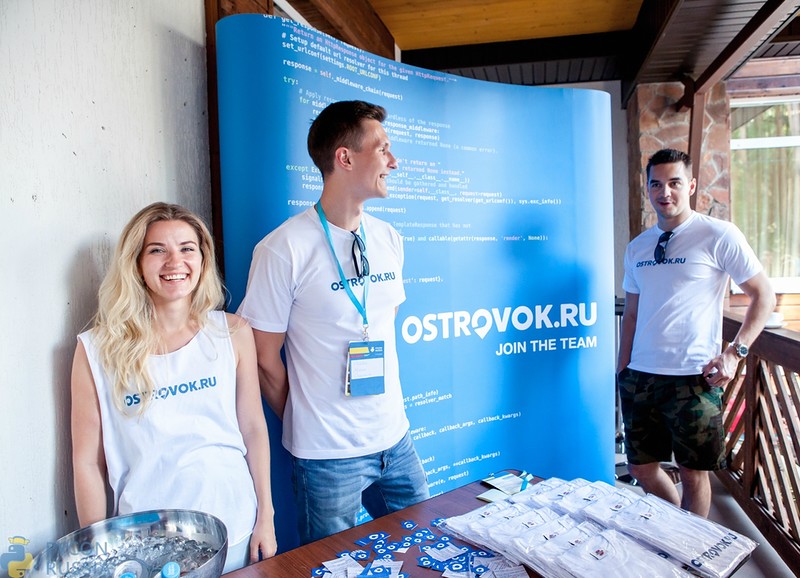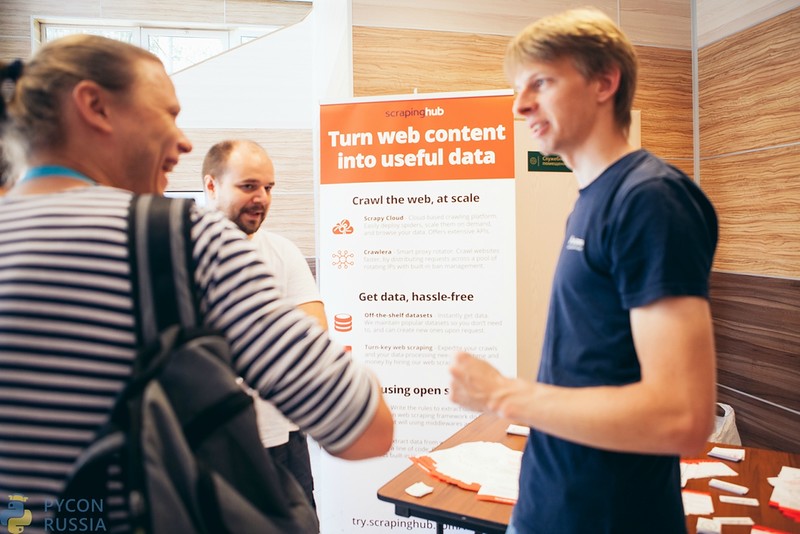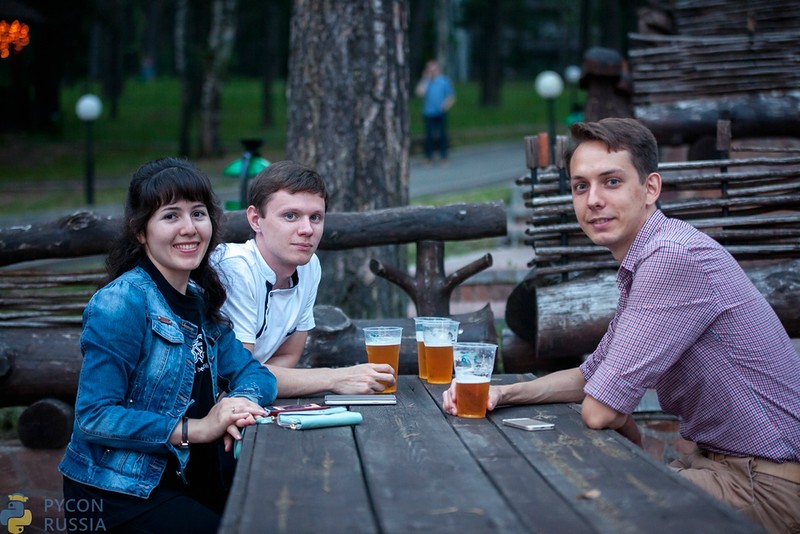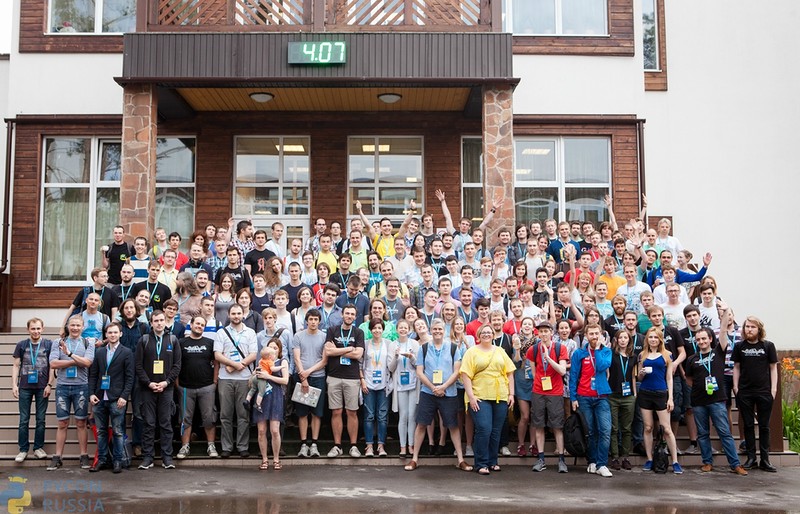PYCONRU-2016: video of all reports and presentations
July 3-4, not far from Moscow, the fourth international conference of python developers PyCon Russia took place . Under the cut - a lot of videos, presentations and photos. And also look at the reporting video - it contains a brief summary of what happened at PyCon-2016, plus a little of the history of the conference.
Reports
Python core developer since 2001, the author and maintainer of many parts of the Raymond Hettinger language (Santa Clara, USA) gave a presentation entitled “Thinking about Concurrency” and conducted a workshop “Descriptors and Context Managers”. According to the results of voting in the telegram-bot @PyconRu_bot, Raymond was recognized as the best speaker. Watch the video and see for yourself.
Nathaniel Manista (San Francisco, USA), a programmer from Google , spoke about the best practices for supporting large software projects in the report “Code Unto Others”. How to design, write and maintain large applications so that edits in one place do not break everything else. By the way, it was on this day that Nathaniel had a birthday :)
Armin Ronacher (Vienna, Austria), author of the Flask framework, the Pallets project, one of the founders of the Pocoo Team, the author of the well-known Python Jinja2 templating system and several open source libraries, loaded the inside of the CPython interpreter with a report “How Python was Shaped by leaky Internals ".
Martin Gorner (France), Developer Relations from Google , told about TensorFlow - a new, fast, smart and flexible machine learning system from Google. By the way, the most popular answer to the questionnaire of the feedback form “Did you have an idea after the conference that you wanted to implement?” Was “To dig out TensorFlow”.
Martin’s small educational program on what TensorFlow is, why Google opened TensorFlow for developers in open source, and how the system may be interesting for developers who are not familiar with machine learning
David MacIver (London, UK) - the author of Hypothesis - a library for easy and smart testing for python, previously worked in Google and several London startups, spoke about the problems of good testing in the report "21st Century Software Testing" and conducted a property-property workshop testing with hypothesis.
Jackie Kazil , Technical Fellow at Capital One , an active participant in the PyLadiesDC, PyLadies Int'l, Women Data Science DC, Python Software Foundation, author of the book Data Wrangling with Python and the Mesa library, told about techniques and design methods that will help inspire developers to more active participation in your project.
Ben Nuttall , manager of the Raspberry Pi Community at the Raspberry Pi Foundation in Cambridge (UK), author of the GPIO Zero python library, gave a talk on "Physical computing with Python and Raspberry Pi".
')
Andrei Svetlov , Python Core Developer , program director of PyCon Russia, spoke about the py.test library. The talk was about writing pytest fixtures (the main extension tool), adding configuration parameters, writing plugins, and other useful things.
A short interview with Andrei about the python language and not only
Andrei Vlasov , PyCharm developer and Vim emulator for programming environments in JetBrains , PyCon Russia program director, explained how type information allows you to find version incompatibility errors, why Dropbox adds type annotations even to Python 2 projects, what's new has already appeared and more will appear in PEP 484 to support Python 2 and 3 compatibility.
The second most popular speaker (following a vote in the bot), Alexander Koshkin , Senior python developer at Positive Technologies from Boston, made a report with the wonderful title “Know and love your CPython in the name of the moon and great justice”.
Shortly before the conference, Alexander briefly told how he lives and works in the US
Ekaterina Tuzova , the developer of PyCharm (St. Petersburg), showed in the report the basic principles of Theano and the general difficulties that the developer faces when she first begins to use the library.
Python's lead development engineer at Rambler & Co, Pavel Petlinsky (Moscow), made a report for inquisitive and curious pythonists. Python "slows down"? We look, how the virtual machine is arranged. Python ate all your memory? We look at how memory management and the data structure in the standard library are arranged. GIL is evil. What happens if you disable it?
Lead Developer / DevOps at Ostrovok.ru Anton Egorov (Moscow) shared his experience and best practices in deploying a Python web application using Docker technology. Anton told how to build an image from scratch, and gave step-by-step instructions that can be used as a template for your applications.
Senior python developer at Positive Technologies Artem Malyshev (Nizhny Novgorod) spoke about the internal structure of Celery and RQ. What problems did their creators face, how did they solve them and how do these solutions threaten the end user? How are groups, chords and eta arranged? How to achieve fault tolerance at the transport level? Why is it hard to scale?
Dmitry Kukushkin , developer at Wargaming.net on the Wolrd Of Tanks Global Map project, told about falcon mic framework. The reasons for which they took the falcon, the pros and cons of this decision, the conclusions they made on the outcome of the implementation of this library - all this in the report of Dmitry.
Senior Python developer at Positive Technologies Ivan Tsyganov (St. Petersburg) explained why domain-specific languages (DSL) are needed, and what problems they help to solve.
Python-developer at Scrapinghub Alexander Sibiryakov (Prague, Czech Republic) told how he built an automatic classifier of applications about false positives in Avast antivirus in order to relieve the virus lab from manual labor.
Before the conference, Alexander told how developers in the Czech Republic live and work.
Konstantin Lopukhin , a developer at Scrapinghub (Moscow), made a report for those who were required to give users the opportunity to expand the application using scripts or macros. When it becomes clear that this is necessary, many problems immediately arise. Build a foreign language or make your own? If someone else, how to organize a sandbox, which will not allow to execute arbitrary code? How to arrange an API and select the desired level of abstraction? How to show the user errors, how to better organize the documentation, how to train new users? When is this generally justified?
Timlid Team Products at HeadHunter , Maintainer of Python infrastructure hh.ru Andrey Sumin (Moscow) told about how Python copes with the workload of the most visited working site in runet (and why it sometimes does not cope).
Andrei Soldatenko (Kiev), CTO in the Australian startup Persollo , python-developer at Toptal , shared his experience and told how to build a large social graph for a social network using python and Graph.
Everyone wants to know how their code is executed. Many people guess how this can be measured. And only a few find the strength to wade through the measurement results. Kirill Borisov , developer of authorization systems from Yandex (Moscow), told how to simplify all this with the help of visualization, namely, flame graphs, beautiful and visual.
Developer from Endpoint.com (involved in distributed systems for visualization of geodata, 3D models and Street View panoramas) Dmitry Kiselev (Yekaterinburg) told why the Robot Operation System is interesting, why it should be used instead of the Middleware framework, and why you need the Robot Operation System, even if you are not a robot.
Alexey Lavrenyuk (Moscow), Yandex developer, author of the open-source project Yandex.Tank, gave a master class “One day in the life of a load tester in Yandex”. Workshops and workshops on the video were not filmed.
On the discussion panel, Andrei Svetlov, Mikhail Korobov, Armin Ronher and Jackie Kazil discussed how and why to write their libraries in python.
Artyom Malyshev, Boris Burkov, Harut Dagesian, Kirill Borisov spoke at the Lightning Talks this year.
Materials
All reports can be viewed on the channel IT-People on YouTube.
Presentations are laid out here (not all, but most).
See photos from the conference in the VKontakte group, on Facebook and on Yandex . Photos .
Breaks and aftepati
Sponsors did not allow to miss between reports.
The General Sponsor, the company Positive Technologies , surprised the participants with a miracle neurological problem. In addition, at their booth, anyone could get a positive research collection on practical safety Positive Research, which was presented at PHDays VI.
JetBrains have licensed PyCharm.
Rambler & Co with the help of his bot played a bunch of sweatshirts, mugs, certificates and made a chic lounge area in nature.
Wargaming gave gifts and played the Swiss charger and jawbone up2 fitness bracelet.
Ostrovok.ru was treated to cold drinks and gave branded gifts.
Scrapinghub set an information stand and gave stickers.
Kiwi.com was treated to aftepati beer.
Bonfire, nature, game store, free beer - the evening passed in the best traditions of PyCon.
Reviews
This year, for the first time, we conducted PyCon not in Yekaterinburg, so it was important for us to know that we liked the conference, it turned out to be useful and interesting.
vezunchik
Workshop with Raymond Hettinger is the best that happened to me in recent times. #pycon
Review by Alexander Korablev:
“PyConRu 2016 is over. This conference was the best of the pycons that took place in Russia. I already wrote that my criterion for a good conference is 3 worthy reports. This time I could easily make a full day section of the magnificent reports (and this is from a two-day conference!). ”
Roman Rybalchenko review + brief summary of the most interesting reports:
“I really liked the organization of the conference, the venue, and the reports themselves. As a beginner pitonist, I was pleased with the variety of topics: CPython core, testing, infrastructure, machine learning, highload. ”
Join bot @PyconRu_bot , subscribe to our channel , to the page on Facebook and you will be the first to know about the new conference. We write infrequently and in the case.
See you at PyConRu-2017!
Source: https://habr.com/ru/post/307044/
All Articles
